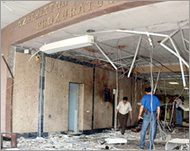Unrest may mar Uzbek poll
Uzbekistan’s authorities need not fear a Ukraine-style revolution at parliamentary elections on Sunday, but recent violent outbursts signal a rough ride ahead for this troubled country, observers say.

President Islam Karimov’s hardline secular leadership faces little threat from the five parties participating in the elections to the 120-seat lower house of a new two-chamber parliament, or Oliy Majlis, which critics expect to be as toothless as the last single-chamber body.
All five are loyal to Karimov and have done little campaigning, while secular opposition groups Erk (Freedom) and Berlik (Unity) remain unregistered and mainly underground.
Karimov has clung to power since the Soviet era through elections and referendums judged by the West as flawed, has imprisoned or exiled opponents and has condoned the security forces’ systematic use of torture, rights campaigners say.
“I haven’t met a single person who has a party preference unless they’re running for parliament,” said a representative of a Western non-governmental group.
“For those who are running it’s just luck of the draw which party they end up in.”
Crackdown
Before polling the authorities have announced extra security measures to prevent attacks after a wave of blasts and shootouts in the spring and summer killed around 50 people.
The attacks were blamed on Islamic opposition groups.
“The government’s still in control – there’s just a sense that they’re not sure how to react. The sense of potential instability has risen” David Lewis, |
Shaken by the ousting of Georgia’s post-Soviet old guard last year and by this winter’s “orange revolution” in Ukraine, Uzbekistan has clamped down on groups it sees as fomenting discontent.
It expelled the Open Society Institute of billionaire democracy promoter George Soros earlier this year, and there has been more pressure on other non-governmental groups before the elections.
Diplomats and business people report a near-total ban on issuing Uzbek visas to foreigners in recent weeks.
“Cars appeared outside my house on Sunday and a security guy asked if I would be protesting – I’m being watched at the moment,” Surat Ikramov, head of the Initiative Group of Independent Human Rights Defenders, said.
Bazaar unrest
If the above-ground opposition is weak, Uzbekistan’s teeming bazaars pose a more immediate problem.
These draw traders from all backgrounds, including professional people unable to survive on their tiny state salaries, and have been linked by some observers to the spring attacks.
 |
|
Several bomb attacks have hit |
Two of the small-scale blasts in March were in Tashkent’s main bazaar and reportedly followed the killing of a trader by police.
This autumn the bazaars have seen a wave of unrest over government attempts to clamp down on imports, culminating in major disturbances in the historic Silk Road city of Kokand on 1 November when two police cars were set alight.
More incidents have occurred before the elections as police have tried to root out Tashkent’s unregistered traders and to force migrant workers out of the city.
On 11 December a man carrying a home-made flame thrower allegedly attacked police in the central market, a day after Karimov had visited. He was charged with terrorism and attempted murder.
Instability
“I haven’t met a single person who has a party preference unless they’re running for parliament” Western NGO representative |
Next day police fought with traders at an intersection crossed daily by Karimov’s heavily armed motorcade, witnesses said.
“The police started beating up one woman and knocked out one of her teeth,” Alima, a 28-year-old fruit seller at the intersection, said.
“Then they dragged another woman along the ground – like a cow – and other women ran to help.”
And critics say things may not improve whenever Karimov, 66, departs.
“The government’s still in control – there’s just a sense that they’re not sure how to react. The sense of potential instability has risen,” David Lewis, an analyst with the International Crisis Group, a security thinktank, said.